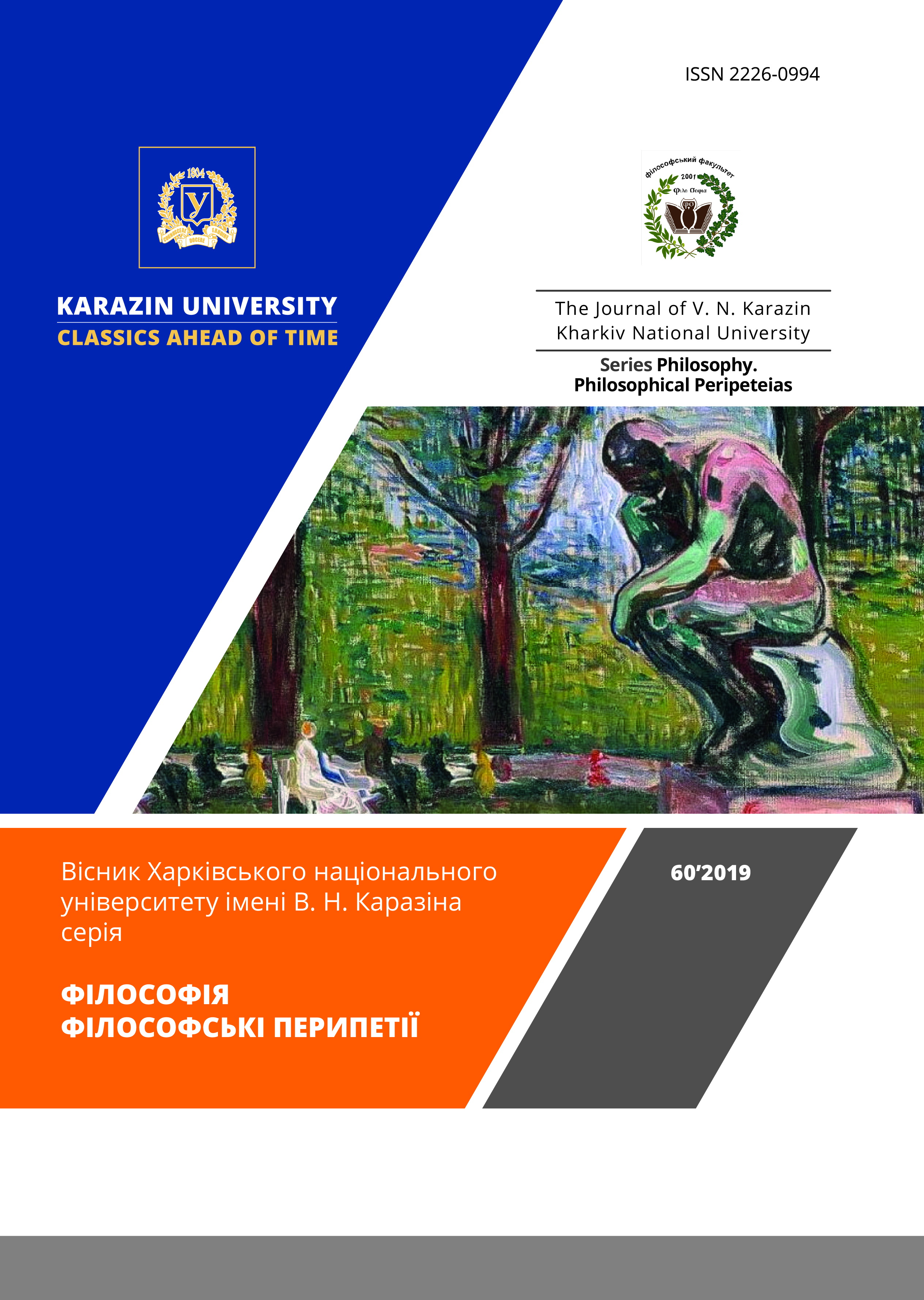ACTUAL EXISTENTIAL ISSUES OF BAROQUE PERIOD IN FOLK-SONGS LEGACY (BASED ON COLLECTION “SONGS OF PEOPLE OF GALICIA” BY Z. PAULI)
Abstract
The article is devoted to context specific of folk songs from the collection “Songs of people of Galicia” by polish folklorist Z. Pauli. General and subjective problems and issues of Ukrainian society in 17th and 18th centuries were revealed. Song’s lyrics were analyzed and actual problems of baroque Ukrainian’s life were highlighted. Each of these problems and issues has it’s specific worldview expression. This worldview response to society and subjective problems of Baroque was presented in folk songs. Thus, the problems of Ukrainian community and personal issues was considered in terms of worldview specific. So, in our point of view the main problems of Ukrainian Baroque society were “cossachyna” and conscription. Attitude of ordinary people to cossacks, their life and role in the state’s fate presented in historical songs, epic songs and Cossack songs. Context of these songs from Z. Pauli collection showed us some important worldview responses to the Cossacks. As a response to the historical events of the seventeenth and eighteenth centuries formed the cult of the warrior’s force. So the main virtues were agility and courage of the warrior. “Cossack glory” was one of the main values in the mass perception of Ukrainians. And was defeating during the battle was the most threat in terms of the relatives of warrior. In the song’s lyrics of 18th century the theme of soldier’s military duty hade wide spreading. Many families had to say good bye to their close relatives. That’s why the frequently motives of soldier songs are farewell, anguish and sorrow. Social problems such as insecurity, orphanhood and gender imbalance, caused by man’s military service, became a relevant for ordinary citizens. Personal existential problems presented in lyric songs and ballads. Widespread subjective problems such as freedom of someone own choice, choice contrary to the social or family opinion, contradictory feelings, emotions and actions outlined in folk-song’s lyrics. Frequently such song’s lyrics expressed metaphysical meditations about loneliness, person’s place in the world, happiness and desire to be happy, the influence of fate on human life etc. This group of songs present a typical Baroque pessimism. So, us our research showed ancient folk songs are real rich source for understanding worldview of our ancestors.
Downloads
References
/References
Bukanova, O. (2009). Factors of Formation of Human Worldviews: Ukrainian Context. Humanitarian Bulletin of Zaporizhzhia State Engineering Academy, 37, 123–128. Retrieved from http://www.zgia.zp.ua/gazeta/VISNIK_37_12.pdf. (In Ukrainian).
Ivanitsky, A. I. (2016). Cossack’s Songs. Choomak’s Songs. Recruit’s and Soldiers’ Songs. In O. Shevchuk, B. Filts, O. Prylepa et al. (Eds.), History of Ukrainian music (Vol. 1. From Ancient Times to the XVIII Century. Book 1. Folk Music). Kyiv: Institute of Art Studies, Folklore and Ethnology named after M. T. Rylskyi. (In Ukrainian).
Makarov, A. M. (1994). The light of the Ukrainian Baroque. Kyiv: Mystetstvo. (In Ukrainian).
Maximovich, M. (1827). Malorussian Songs, Edition by M. Maksimovich. Moscow: Typography of August Semen. (In Russian, in Ukrainian).
Pauli, Z. (1839). Songs of People of Galicia (Vol. 1). Lviv. (In Polish, in Ukrainian).
Pauli, Z. (1840). Songs of People of Galicia (Vol. 2). Lviv. (In Polish, in Ukrainian).
Certelev, N. (1819). Experience of Collecting Old Malorussian Songs. Retrieved from https://archive.org/stream/opytsobraniiasta00unse#page/n9/mode/1up.
Chyzhevskyi, D. I. (2005). Philosophical Works in Four Volumes (Vol. 1). Kyiv: Smoloskyp. (Original work published 1931). (In Ukrainian).
Буканова О. Фактори формування світоглядних орієнтацій людини: український контекст [Електронний ресурс]. Гуманітарний вісник Запорізької державної інженерної академії: Вип. 37. Запоріжжя: Видавництвово ЗДІА, 2008. С. 123–128 URL: http://www.zgia.zp.ua/gazeta/VISNIK_37_12.pdf.
Іваницький А. Козацькі пісні. Чумацькі пісні. Рекрутські та солдатські пісні. Історія української музики в семи томах. Том 1: Від найдавніших часів до XVIII століття. Книга 1: Народна музика / за ред. О. Шевчук, Б. Фільц, О. Прилепи та ін. Київ: ІМФЕ ім. М. Т. Рильського, 2016. 440 с.
Макаров А. Світло українського бароко. Київ: Мистецтво, 1994. 288 с.
Максимович М. Малороссійскія песни, изданныя М. Максимовичемъ. Москва: Типография Августа Семена, 1827. 234 с.
Цертелев Н. Опытъ собранія старинныхъ малороссійскихъ песней [Електронний ресурс]. 1819. URL: https://archive.org/stream/opytsobraniiasta00unse#page/n9/mode/1up.
Чижевський Д. Філософські твори: в 4-х томах. Т. 1. Київ: Смолоскип, 2005. 402 с.
Pauli Z. Piesni ludu ruskiego w Galicyi. Tom pierwszy. Lwow: Nakladem Kajetana Jablonskiego, 1839. 180 с.
Pauli Z. Piesni ludu ruskiego w Galicyi. Tom drugi. Lwow: Nakladem Kajetana Jablonskiego, 1840. 219 с.
Authors who publish with this journal agree to the following terms:
- Authors retain copyright and grant the journal right of first publication of this work under the terms of a license Creative Commons Attribution License 4.0 International (CC BY 4.0).
- Authors are able to enter into separate, additional contractual arrangements for the non-exclusive distribution of the journal's published version of the work (e.g., post it to an institutional repository or publish it in a book), with an acknowledgement of its initial publication in this journal.
- Authors are permitted and encouraged to post their work online (e.g., in institutional repositories or on their website) prior to and during the submission process, as it can lead to productive exchanges, as well as earlier and greater citation of published work.






3.gif)




